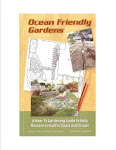Grass Removal through Sheet Mulching/Composting
Here's a technique from Green Gardens Group's (G3) Pamela Berstler:
1. If it's just plain old fescue or some other cool-season turf (seed produced above ground), sheet mulch/compost away. 

2. I'd remove the turf in any case, and use it green-side down as a layer in the mulch if it's just a nice fescue. But, that's my gluttony for punishment (removing turf is tough work!)

3. Apply compost tea or a layer of compost 1" or so BEFORE the weed barrier (cardboard, painter's paper, etc) goes down.
4. Water the soil BEFORE putting down the paper -- you want it to get hot beneath the cover (so so speak).
5. Layer 2" - 4" EACH dry leaves, straw, or other mulch material, then wet materials (compost). Then put dry material down to top it off. In the wet layer (compost), add a little garden soil to the mix as it's being put down -- this will stimulate any microbes asleep in the soil to wake up and smell the compost. -- and get to work. Think 5" - 8" of FINISHED layering as a minimum -- it's essentially a raised bed for planting.
6. Water thoroughly
7. Bake at 350 -- oh, that's the recipe for short bread, sorry -- plant. Water thoroughly on a regular basis while this stuff starts to cook.
This recipe assumes you are planting vegetables in this raised bed area. (bacteria-based microbes go to work quickly and support grassy, weedy things like veggies) If you are planting perennials, shrubs, etc. , then the sheet compost should cook for a couple weeks before moving forward. (fungal-based guys go to work to support the woody plants).
Most of the "literature" from gardeners says "go ahead and plant right away" since the veggies are SO bacterially based & they don't need the heavy nutrient stuff created by the breaking down of more celluose items like wood chips or mulch. If the compost is salty (which, BTW, I am completely assuming it will be, if it contains horse manure), then they may get tip-burning. Applications of compost tea may remedy this -- steady watering too."
Here's a link to the "recipe" offered by Marin Municipal Water District.



1 comments:
All variable names in SuperCollider must start with a lowercase letter and cannot be a reserved word. You cannot have a variable called "var" because var already has a special meaning to the interpreter.speech recognition program
Post a Comment